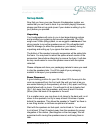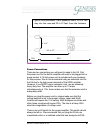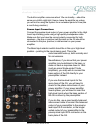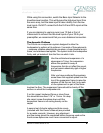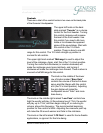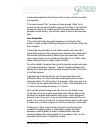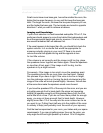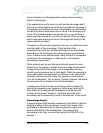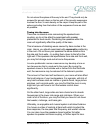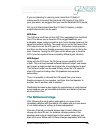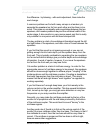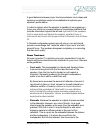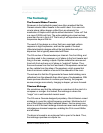
Genesis 5.3 Owners Manual Ver 2.2
11
~ÄëçäìíÉ=ÑáÇÉäáíó™
(toe-in) towards your listening position until you have a properly
defined center image.
If the speakers are too far apart you will lose the side image and if
they are too close together you will have too small a center stage. If
the speakers are far apart and toed-in significantly, you will find that
you will only have a small sweet spot in which to sit and enjoy your
music. When these speakers are properly set up, you will have a
sweet spot wide enough for you and your partner. When you sway
side to side while enjoying the music, the image and tonality of the
system should not waver.
The spikes on the acoustic suspension give you an additional control
over the height of the soundstage. Tilting the front of the
loudspeaker up and down will affect the height of the soundstage
depending on the furnishings and wall coverings in your listening
room. In some rooms with hard walls, tilting the front of the speaker
up will lower the soundstage. In other rooms, it will raise the
soundstage. Experiment!
When properly set up very little sound should appear to come
directly from the speaker, instead, the sound stage should extend
far beyond the left and right edge of the loudspeakers and they
should have tremendous front to back depth. When the recording is
close miked (when the instrument or performer is very close to the
recording microphone) the music may appear to come directly
from the loudspeaker. This is normal. Typically, however, the sound
should appear to be detached from the loudspeakers.
A simple rule of thumb to follow is that focus will be achieved by
placing the speakers closer together or farther apart, and front to
back depth can be adjusted by the distance from the rear wall.
Further, as the system “breaks in”, the depth and width of the
soundstage will increase and so will the “smoothness” of the sound.
Soundstage Height
A unique feature of the acoustic suspension is the ability to alter the
height and shape of the soundstage. In most “live” rooms, if the
soundstage is deemed to be too low, increase the height of the
spikes at the BACK of the loudspeaker. If the height of the
soundstage is too high, increase the height at the FRONT of the
speaker.



